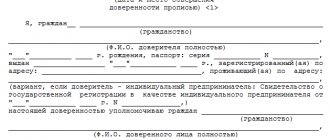In what cases is a power of attorney required to represent the interests of an individual?
A deed of trust transferring the powers of an individual to the principal to provide his interests may be required for:
- defending the interests of the principal in the judicial authorities;
- making any corrections to state registers;
- carrying out transactions with movable and immovable property;
- registration of rights to inherit property.
The deed of trust can be issued either to a private person (friend, brother, matchmaker) or to an organization. If a private person becomes a trusted person, then he must already have reached eighteen years of legal age. If an enterprise is to act as a trusted person, then it must operate on the basis of a license. The drawing up of a trust deed, in this case, should be regulated by the current Legislation and instructions governing the actions of notarial authorities.
If the trustee, for some reason, is unable to fulfill the powers assigned to him, he may carry out the procedure of transferring his duties to another person. In this case, it is necessary to notify the principal. When drawing up a trust guarantee for several persons at once, the document must clearly state the powers of each of them. When registering a trust for an enterprise or organization, the name of the company is indicated.
Who has the authority to issue a power of attorney to represent the interests of individuals? persons
According to the Law, issue trust orders to represent the interests of individuals. persons, any person who has reached legal age can.
Important! For the tax service, such a person can be any private entrepreneur.
The fact of loss of full or partial legal capacity is considered valid only in accordance with a court decision. This may apply to such categories of citizens as drug or alcohol dependent people and mentally ill persons.
Exceptions to achieving legal capacity and obtaining the right to issue trust deeds, despite incapacitated age, may include the following cases:
- the fact of entering into a marriage relationship;
- registration of labor relations by concluding contracts with persons under the age of majority.
In case of incomplete loss of legal capacity, an individual can issue a guarantee for another person or organization to represent his interests, within the framework of current legislation.
As previously mentioned, the attorney must be fully capable. And if this special organization is going to act, then it must have legal confirmation of the legality of its activities.
When entrusting powers to a branch or department of an enterprise, the branch is not registered in the deed of guarantee, but is limited to the name of the main office.
The trust can be transferred not to one, but to several persons at once.
The regulations do not stipulate a specific number of citizens who can issue acts of trust or to whom powers can be transferred.
Power of attorney for apartment management - details about document execution
> > > What is a power of attorney for apartment management?
The parties have the right to provide in the document for other actions that the representative is allowed to perform. Documents required to formalize a power of attorney A power of attorney is drawn up in writing.
The use, management or disposal of an apartment is the prerogative of its owner.
In the event that for some reason he wishes to share his exclusive right to own property with another person, it is necessary to draw up the specified paper. In recent years, this practice has become very popular in our country, however, the procedure for drawing up trust documents has become slightly more complicated. A similar phenomenon is due to the fact that a considerable number of scammers, using fake powers of attorney, carried out illegal fraud. Now, in order to correctly draw up a trust document for the management of an apartment, the owner must carefully familiarize himself with all the nuances of this procedure, and even better, use the services of a professional lawyer. Contents:
Legislative settlement of the issue related to the representation of the interests of the property owner. When deciding to issue a power of attorney, each owner should familiarize himself with the legislation that regulates the procedure for carrying out this procedure. Fortunately for many, the concept of “representation” and everything connected with it is clearly explained in a separate chapter Civil Code of the Russian Federation (Civil Code of the Russian Federation). So, in accordance with Chapter 10 of the current Civil Code of the Russian Federation, the following concepts can be distinguished: Representative office
Who can be a trustee?
Types of persons capable of representing the interests of individuals.
persons depend on the actions that are assigned to them. In trust practice, such parties can be a person - the principal and a person - the trustee.
A principal is a person (individual or legal) who transfers certain rights to represent his interests in certain authorities. Its actions are regulated by civil law and require competent and careful execution of a trust deed, a clear identification of persons to transfer powers, as well as a list of duties assigned to them.
A fiduciary is a person who is entrusted with the authority to represent the interests of the principal. A trustee is a person who assumes his or her powers on the basis of a deed of trust. This person can be any adult citizen who has reached legal age. His rights are regulated by legal norms.
Important! The services of the trustee are paid for by the principal, which should be reflected in the provision of the deed of trust.
In what cases is a notary required?
Let's talk about those types of trust documents that require mandatory notarization.
- When drawing up rental agreements.
- For registration of rights or transactions in state self-government bodies.
- To certify ownership of real estate.
- To complete the transfer procedure.
Sample power of attorney for apartment management
Power of attorney for the management and disposal of an apartment Each owner of an apartment has the right to exercise management, use and disposal functions in relation to it. This opportunity is provided to him by civil law, and it is the exclusive prerogative of the title owner of the property, that is, the person indicated in the title and title documents.
At his own discretion, the owner can entrust the exercise of powers to manage and dispose of his property to any capable person.
Such an order is issued in the form of a power of attorney - a unilateral transaction, which is drawn up in writing and must be certified by a notary. Depending on the scope of powers, powers of attorney to perform legally significant actions in relation to an apartment are divided into: Power of attorney to manage an apartment. The need for this instruction arises in a number of cases, in particular when the title owner does not have the time or opportunity to deal with the preparation of various documentation in relation to the apartment.
Also, such powers of attorney are often issued by landlords in the name of close relatives or realtors, so that they have the authority to rent out real estate. The following powers may be included in the text of the power of attorney for apartment management: to represent interests in municipal, state institutions, management companies, housing and communal services organizations, gas, water management, and electrical networks;
Power of attorney for a person to represent the interests of the owners of premises in an apartment building for the management of the apartment building
Subject of the document: Text version file: 7.3 kb Save the document: Power of attorney to a person for the right to represent the interests of the owners of premises in an apartment building for the management of an apartment building ___________________________________________________________ (place and date of issue of the power of attorney in words) Citizen of the Russian Federation ________________________________________ (last name, first name, patronymic) _____ year of birth, passport: series _____ N __________, issued by _____________ ________________________________ "___"__________ ____, division code __________, residing at the address: _______________________________________, owner of residential (non-residential) premises in an apartment building at the address: __________________________________________________________________________, citizen of the Russian Federation _________________________________________ ( surname, name, patronymic) _____ year of birth, passport: series _____ N __________, issued by _____________ ________________________________ "___"__________ ____, division code __________, living at the address: _______________________________________, owner of residential (non-residential) premises in an apartment building at the address: _____________ ____________________________________________________________, hereinafter referred to as “owners of premises”, on the basis of a decision of the general meeting of owners of premises in an apartment building at the address: ________ ________________________________________________ dated “___”__________ ____ city N _______, who directly manage such a building, are entrusted
How to issue a general power of attorney to represent the interests of an individual in 2021?
A general trust act is necessary to transfer powers from one person to another, regarding any property, values and defending interests in different authorities and structures.
The general trust document must clearly state the property entrusted for disposal. Simply put, while having the right to complete disposal of material resources, the trustee does not have the ability to independently perform any actions in relation to movable property.
The general form of the trust document, unlike others, requires mandatory notarization.
Basic design rules
- Design features.
Unlike other trust documents, a general trust deed requires strict compliance with the established form, namely:
- Contain complete reliable information about the person transferring authority, namely the data contained in the passport and the indication code;
- Contain complete reliable information about the person receiving the authority, namely the data contained in the passport and the indication code;
- Contain the most extensive data on transferred powers and rights;
- Contain the most accurate information about the existing powers of third parties, if any;
- Contain information about the place where the document was drawn up and the date of its registration;
- Contain clear expiration dates and signatures of representatives of both parties.
When entrusting your powers to a trusted person, you must clearly understand that all actions and words emanating from him will be regarded as the actions of the trustee himself.
Important! When choosing a trusted person, you must be extremely careful, since any mistake in this matter can make you a victim of scammers.
Difficulties often arise when revoking a “general”, especially with the right to transfer powers to third parties. When establishing the fact of revocation, third parties specified in the document must be notified. The difficulty is that there can be an unlimited number of them and a lot of time can be spent on this action.
Power of attorney for representation in court
Paragraph 2 of Article 53 of the Civil Procedure Code of the Russian Federation dated November 14, 2002 No. 138-FZ establishes: “Powers of attorney issued by citizens can be certified by a notary or by the organization in which the principal works or studies, a homeowners’ association, a housing, housing -a construction or other specialized consumer cooperative that manages an apartment building, a management organization at the principal’s place of residence , the administration of a social service organization in which the principal is located, as well as an inpatient medical institution in which the principal is undergoing treatment...”
As follows from the above norm, the management company/homeowners association/housing cooperative have the right to certify powers of attorney if the principal (the person who issues the power of attorney to the attorney to perform legally significant actions) lives in a house managed by this organization. It is important to note several significant points:
1. The management company/homeowners' association/housing cooperative has the right to certify a power of attorney when only the principal applies. The essence of certifying a power of attorney is to confirm that it is the person who has a certain right who actually transfers this right to another person, that is, the fact that the power of attorney is signed by the right holder indicated in the power of attorney as the principal is verified. Consequently, when applying for a power of attorney not from the principal, but from an attorney or other person, the management company/homeowners association/housing cooperative does not have the right to certify such a power of attorney under any circumstances;
2. A power of attorney can be certified by the MA/HOA/housing cooperative only at the place of residence of the principal, regardless of the ownership of the residential premises. If the principal owns the premises in a house managed by the MA, but is registered at a different address, the MA does not have the right to certify the power of attorney of such a principal.
3. The current legislation of the Russian Federation does not establish that in the case provided for in paragraph 2 of Art. 53 of the Code of Civil Procedure of the Russian Federation, management organizations/homeowners' associations/housing cooperatives are required to certify the power of attorney free of charge. Thus, there is no prohibition on the approval of the MA/HOA/housing cooperative of the cost of the service for certification of powers of attorney and the provision of certification services on a paid basis. It should be noted that in one sentence defining the options for certifying powers of attorney, the possibility of certifying a power of attorney both by the management authority/homeowners association/housing cooperative and by a notary is indicated. It is well known that notary services are paid; the norm in question does not contain any clauses on the obligation of other persons to certify the same powers of attorney for free (unlike, for example, the previously discussed clause 3 of Article 185.1 of the Civil Code of the Russian Federation). Consequently, the management organization/homeowners' association/housing cooperative has the right to provide services for certification of powers of attorney on a paid basis (for example, the Fourteenth Arbitration Court of Appeal in the Resolution of March 19, 2014 in case No. A05-12575/2013 notes that in relation to powers of attorney certified by management organizations , neither the Housing Code of the Russian Federation nor other regulations stipulate that certification of such powers of attorney should be free of charge).
4. The phrase “powers of attorney... can be certified ...” indicates the right of the management company/homeowners association/housing cooperative to certify powers of attorney, and not the obligation to do so. That is, an organization has the right to refuse to certify a power of attorney (even for a fee), since this is its right and not an obligation . Consequently, the owner or tenant of premises in a house managed by such an organization does not have the right to demand that a power of attorney be certified to him (although the principal has the right to apply for such a certificate, but the unconditional obligation of the management company/homeowners association/housing cooperative to carry out such certification is not established by law).
5. The right to certify powers of attorney is enshrined in clause 2 of Art. 53 of the Code of Civil Procedure of the Russian Federation, this norm is included in Chapter 5 of the Code of Civil Procedure of the Russian Federation “Representation in Court”, from which it follows that the management company/homeowners association/housing cooperative, in accordance with this norm, has the right to certify powers of attorney only for representation of interests in the courts .
Example of a power of attorney to represent the interests of an individual in 2021
Notarization may also have certain nuances.
A) when faced with notarization of a general deed of trust, you may encounter some difficulties.
Namely, the lawyer of the notary office is clearly aware of the risks the principal bears when drawing up a “general document”, so he may advise replacing this document with several others, such as a one-time or special trust deed. In this case, the principal incurs large material costs. The important point here is how trusting the relationship between the two parties is and, based on this, the type of execution of the deed of trust is selected. B) you can go through the notarization procedure at any notary office in the country, regardless of your place of registration.
C) a trust deed receives legal force not only after notarization; for this, you can also contact other authorized bodies. There are situations when the principal is in places where an authorized notary cannot enter, namely prisons, military barracks. In these cases, the right of certification passes to the head or commander of the unit or colony.
D) “General papers” cannot be certified with electronic signatures or facsimiles. For this, only the original signatures of the persons involved are required.
E) Separate requirements relate to the provided digital information, which must additionally be written down in words.
In practice, there are cases when a power of attorney has already been drawn up and even notarized, and then it is discovered that it is not accurate. In this case, there is no need to re-draft the document, but it will be enough to make the necessary corrections and certify them with signatures and a notary.
The validity period of the general act is usually limited to one year, however, with the new version of the Law, you can independently indicate the required period of validity, with mandatory registration in the document.
Important! In practice, such a law cannot have full force, because notary offices do not have the legal right to approve trust deeds issued for a period of more than five years.
2) Current samples of trust documents.
Let's look at a sample of filling out a general document for such movable property as a car.
05/28/2018 | Certification of powers of attorney by the management organization or HOA
Quite often, persons managing multi-apartment buildings (hereinafter - MKD), including management organizations (hereinafter - MA), homeowners' associations (hereinafter - HOA), housing construction cooperatives (hereinafter - HBC), are faced with demands from residents of managed MKD to certify any powers of attorney to perform certain actions.
Let's figure out in what cases the management company/homeowners' association/housing cooperative has the right and responsibility to certify powers of attorney, whether they are obliged to do this for free or have the right to demand payment for such certification.
Part 1 of Article 48 of the Housing Code of the Russian Federation establishes that voting at a general meeting of owners of premises in an apartment building (hereinafter referred to as the GSM) is carried out by the owner of the premises in this building, both personally and through his representative. Part 2 of Article 48 of the Housing Code of the Russian Federation establishes that the representative of the owner of premises in an apartment building at a general meeting of owners of premises in this building acts in accordance with the powers based on the instructions of federal laws, acts of authorized state bodies or acts of local government bodies, or drawn up in writing form . The power of attorney for voting must contain information about the represented owner of the premises in the corresponding apartment building and his representative (name or designation, place of residence or location, passport details) and must be drawn up in accordance with the requirements of paragraphs 3 and 4 of Article 185.1 of the Civil Code of the Russian Federation or notarized.
What is the cost of registering a power of attorney with a notary in 2021?
Speaking about the payment for issuing a power of attorney, the cost for notary services is taken based on two main components, namely: government tariffs and notary fees.
As for state fees, they are the same throughout the country, but notary fees vary depending on the region and many other constituent factors. Factors that may influence the price for notary services:
- Personal visit to the principal for certification;
- The complexity factor of the certified trust document, the more points of authority, the higher the prices;
- The number of persons involved in registration;
- The nature of the principal, namely whether it is a company or an individual;
- The degree of workload of a notary, the larger the locality, the higher the prices.
Validity period of the trust certificate
The validity period of a trust deed, without specifying the expiration date of the legal force of the document, cannot exceed one year.
It is not permitted by law to draw up a trust deed for more than three years. After this, the document automatically loses its validity and must be reissued.
Power of attorney for heat, water, gas and electricity supply to a residential building
Notary / Useful information / Power of attorney for heat, water, gas and electricity supply to a residential buildingPOWER OF ATTORNEY St. Petersburg, (day, month, year)
I, citizen of the Russian Federation Ivanov Ivan Ivanovich, born March 00, 1900, place of birth: Leningrad, gender - male, passport 40 00 000000 issued by TP No. 65 of the Department of the Federal Migration Service of Russia for St. Petersburg and the Leningrad Region. in the Primorsky district of the mountains. St. Petersburg on March 15, 2000, registered at the address: St. Petersburg, Vasika street, building 3, building 4, apartment 5, with this power of attorney I authorize Ivan Ivanovich Ivanov, born April 00, 1980, passport 40 00 000010 issued by TP No. 65 of the Department Federal Migration Service of Russia for St. Petersburg and Leningrad region. in the Primorsky district of the mountains. St. Petersburg on March 15, 2000, registered at the address: St. Petersburg, Vasika street, building 3, building 4, apartment 159,
to be my representative in all administrative, state and other bodies, institutions and organizations of St. Petersburg, including CJSC PetroElectroSbyt, LLC PeterburgGaz, OJSC Lengaz-Ekspluatatsia, OJSC Lenenergo on all issues related to gas supply to a residential building at the address: St. Petersburg, ____________________, for which I grant the right to obtain technical specifications, order and receive gas supply projects, approve projects, conclude and sign agreements with design and other organizations, including agreements for the installation of equipment, devices, their maintenance and use of gas, with operating services, conclude and sign contracts for the construction of a gas pipeline, commissioning work, for the supply and use of gas, register contracts and emerging rights in the manner prescribed by law, receive title documents after registration, sign acceptance certificates -transfers, make payments under contracts, use funds provided by me when making payments, be my representative in all organizations and institutions of St. Petersburg and in relations with individuals and legal entities, regardless of their form of ownership, on the issue of negotiations, supply and connection of electricity supply to the above residential building, for which I grant the right to submit and receive all necessary documents, certificates and applications, approve projects, enter into agreements with design, construction and other organizations, energy supply authorities, including for the production and approval of project documentation, provision of connection services electrical power, conclude and sign, at a price and on terms at your discretion, a contract for electricity supply, be my representative in all organizations and institutions of St. Petersburg and in relations with individuals and legal entities, regardless of their form of ownership, on the issue of negotiations, supply and connection of water supply to the above-mentioned residential building, for which I grant the right to submit and receive all necessary documents, certificates and applications, approve projects, enter into agreements with design, construction and other organizations, water supply authorities, including for the production and approval of project documentation, provision of services for the installation of water supply, to conclude and sign a contract for water supply at a price and on terms at your discretion, to be my representative in all organizations and institutions of St. Petersburg and in relations with individuals and legal entities, regardless of their form of ownership, on the issue of negotiations, supply and connection of heat supply to the above-mentioned residential building, for which I grant the right to submit and receive all necessary documents, certificates and applications, approve projects, enter into agreements with design, construction and other organizations, heat supply authorities, including for the production and approval of project documentation, provision of services for connecting a heating pipeline, conclude and sign a heat supply agreement for a price and on terms at your discretion, - put into operation the above-mentioned residential building with all communications, for which I provide the right to approve and receive design and other documentation, including certificates of maintenance title documents and other documents, certificates F7, F9, conclude and sign contracts, sign acceptance certificates, make changes (clauses) to contracts; receive technical specifications, represent my interests on the issue of design, as well as in the delivery of external and internal gas pipelines, for which I grant the right to be my representative in all state, administrative and other bodies, organizations and institutions of St. Petersburg, including the Federal Service Administration State registration, cadastre and cartography for St. Petersburg, Administration, District Design and Inventory Bureau of St. Petersburg, Committee on Land Resources and Land Management of St. Petersburg, Office of the State Land Cadastre of St. Petersburg, Committee on Housing Policy, Committee on Maintenance of Housing Fund , Interdepartmental Commission for Technical Supervision, State Administrative and Technical Fire Protection Service, Energy Supply Service, GATI, SES, Committee for Landscaping and Road Facilities, USPKh, Municipalities, Federal Tax Service, as well as before representatives of these organizations and institutions, on the above issues, with the right submitting applications on my behalf, concluding and signing contracts for maintenance or provision of services, submitting and receiving documents, certificates, acts, agreements, resolutions, calling commissions and signing acceptance certificates, paying state duties and fees, signing for me, performing all actions and formalities associated with these instructions. The power of attorney was issued for a period of three years, with the right of substitution.
Revocation rules
If a power of attorney loses its relevance, it is subject to a revocation procedure, the reasons for which may be the following:
- Expiration of the document;
- Application by the principal to terminate his trust decision;
- Demonstration by a trusted person of unwillingness to fulfill assigned duties;
- The passing of their life or the partial loss of legal capacity of a trusted person;
- The death of their life or the partial loss of legal capacity of the principal.
The fact of cancellation of the action must be confirmed by the notary who certified it, on the basis of a statement drawn up by the principal.
Based on the application and requested documents, the notary makes the necessary amendments to the state register.
After this, the trustee is obliged to immediately notify the trusted person of the termination of the power of attorney. It is from the moment the addressee becomes aware of the cancellation that it comes into force.




